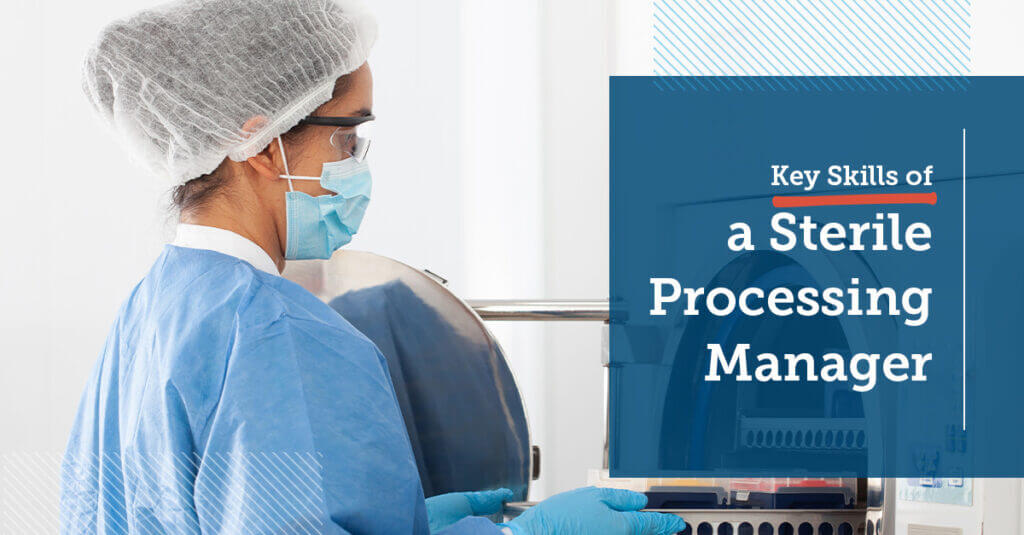Key Skills of a Sterile Processing Manager
Key Skills of a Sterile Processing Manager
In the healthcare industry, sterile processing management is crucial to ensuring the safety and quality of patient care. This position requires a unique set of skills and expertise that go beyond just technical proficiency. A sterile processing manager must possess a deep understanding of their responsibilities, demonstrate strong leadership and management skills, and pay meticulous attention to detail.

Understanding the Role of a Sterile Processing Manager
A sterile processing manager is responsible for overseeing the sterilization and distribution of medical instruments and equipment. Their main objective is to maintain a high standard of cleanliness and sterile conditions in healthcare facilities. This involves managing a team of technicians, implementing quality control measures, and staying up to date with industry regulations and best practices.
Furthermore, a sterile processing manager must possess strong leadership skills to effectively coordinate and motivate their team. These skills revolve around soft skills and emotional intelligence, per research over the past few decades (Harvard Business Review 2016). They are often required to conduct regular training sessions to ensure that all staff members are well-versed in proper sterilization techniques and safety protocols. By fostering a culture of continuous learning and improvement, the manager can enhance the overall efficiency and effectiveness of the sterile processing department.
Responsibilities and Duties
Sterile processing manager responsibilities are diverse and demanding. They are responsible for creating and implementing effective sterilization processes, ensuring compliance with infection control guidelines, and maintaining accurate records of sterilization procedures. Additionally, they must oversee the inventory management of sterile supplies and collaborate with other departments to ensure an efficient workflow.
In addition to these core responsibilities, a sterile processing manager is also tasked with conducting regular audits and inspections to assess the effectiveness of sterilization procedures and identify areas for improvement. By conducting thorough evaluations and implementing necessary changes, the manager can continuously enhance the quality of services provided by the sterile processing department.
Importance in Healthcare Industry
The role of a sterile processing manager is of paramount importance in the healthcare industry. A controlled and sterile environment is crucial in preventing the spread of infections and ensuring the safety of both patients and healthcare workers. By leading a team of dedicated professionals and implementing rigorous sterilization protocols, a competent sterile processing manager plays a vital role in maintaining patient safety and minimizing the risk of healthcare-associated infections.
Moreover, the role of a sterile processing manager extends beyond the confines of the healthcare facility. They are often involved in research and development activities to explore innovative sterilization techniques and technologies that can further enhance the safety and efficiency of medical instrument processing. By staying abreast of the latest advancements in the field, the manager can proactively introduce innovative practices that benefit both the healthcare facility and its patients.
Essential Skills for Sterile Processing Managers
Technical proficiency alone is not sufficient for a sterile processing manager to excel in their role. They need to possess a diverse range of skills and competencies to effectively manage their team and ensure the highest level of sterility in healthcare facilities.
But what are these essential skills that make a sterile processing manager truly exceptional? Let’s look at the key attributes that set them apart.
Technical Proficiency
A sterile processing manager must have a thorough understanding of sterilization techniques, equipment, and regulations. They need to stay updated with the latest advancements in sterilization technology and be knowledgeable about the proper handling and care of medical instruments. This technical proficiency enables them to make informed decisions and provide solutions to complex sterilization challenges.
Moreover, their expertise extends beyond the realm of sterilization. They possess a comprehensive knowledge of medical devices and their functionalities, allowing them to ensure the proper functioning of equipment and troubleshoot any issues that may arise.
Leadership and Management Skills
To effectively manage a team of technicians, a sterile processing manager must possess strong leadership and management skills. They need to be able to delegate tasks, provide guidance and support, and foster a culture of collaboration and continuous improvement. By promoting a positive work environment and prioritizing staff development, a skilled sterile processing manager can enhance team performance and overall efficiency.
Additionally, they are adept at conflict resolution and can handle challenging situations with tact and diplomacy. Their ability to communicate effectively and build strong relationships with their team members fosters a sense of trust and loyalty, resulting in a cohesive and motivated workforce.
Attention to Detail
Attention to detail is a critical skill for a sterile processing manager. They must meticulously follow established protocols and guidelines to ensure the sterility of medical equipment. By conducting thorough inspections and audits, they can identify any potential risks or deviations from established procedures. This level of attention to detail enables them to address issues promptly and maintain the highest standards of sterility.
Furthermore, their keen eye for detail extends to the organization and management of the sterile processing department. They meticulously plan and coordinate the workflow, ensuring that all processes are streamlined and efficient. By implementing quality control measures and monitoring performance indicators, they continuously strive for excellence in their department.
As you can see, being a sterile processing manager requires more than just technical expertise. It demands a unique combination of technical proficiency, leadership and management skills, and an unwavering attention to detail. By embodying these qualities, a sterile processing manager can truly excel in their role and contribute to the delivery of safe and effective healthcare.
The Journey to Becoming a Sterile Processing Manager
Becoming a sterile processing manager requires a significant investment of time, education, and experience. While the specific requirements may vary, there are some common steps and milestones on the path to attaining this leadership role.
Educational Requirements
Most sterile processing managers hold a bachelor’s degree in healthcare management, sterile processing, or a related field. However, some individuals may enter this field with an associate degree, certification, and relevant work experience. Advanced degrees or certifications can also enhance career prospects and provide additional opportunities for growth.
Obtaining a bachelor’s degree in healthcare management equips aspiring sterile processing managers with a comprehensive understanding of healthcare policies, regulations, and management principles. Courses in infection control, quality assurance, and healthcare technology provide a solid foundation for overseeing sterile processing operations.
Gaining Relevant Experience
In addition to formal education, gaining relevant experience is crucial in preparing for a role as a sterile processing manager. This can be done through internships, work placements, or entry-level positions in sterile processing departments. Building a solid foundation of technical knowledge and understanding the intricacies of the sterilization process will contribute to success in this role.
Internships and work placements offer aspiring sterile processing managers the opportunity to apply their theoretical knowledge in real-world settings. They can gain hands-on experience in decontamination, instrument assembly, and sterilization techniques. These practical experiences not only enhance technical skills but also provide valuable insights into the daily challenges and responsibilities of a sterile processing manager.
Pursuing Certification
Certification is not always a mandatory requirement for sterile processing managers, but it can greatly enhance their professional credibility and career opportunities. The Certification Board for Sterile Processing and Distribution (CBSPD) and the International Association of Healthcare Central Service Materiel Management (IAHCSMM) offer certification programs that validate the expertise and knowledge of sterile processing professionals.
Obtaining certification demonstrates a commitment to excellence and ongoing professional development. It requires passing a rigorous examination that assesses knowledge in areas such as infection control, sterilization techniques, and regulatory compliance. Certified sterile processing managers are recognized as experts in their field and are often sought after by healthcare organizations that prioritize patient safety and quality care.
Furthermore, maintaining certification requires participating in continuing education activities, ensuring that sterile processing managers stay up to date with the latest advancements and best practices in the field. This commitment to lifelong learning not only benefits their own professional growth but also contributes to the overall improvement of sterile processing practices in healthcare settings.
Challenges Faced by Sterile Processing Managers
There are various challenges in day-to-day operations as a sterile processing technician manager. Overcoming these challenges requires a proactive approach, adaptability, and a comprehensive understanding of industry trends.
Maintaining Sterility Standards
Maintaining sterility standards can be a constant challenge for sterile processing managers. With the introduction of new surgical techniques and medical devices, ensuring the effectiveness of sterilization protocols becomes increasingly complex. Sterile processing managers must stay abreast of emerging trends and standards, continuously evaluate and update their processes, and invest in training and education to address these challenges effectively.
Managing Staff and Workflow
The efficient management of staff and workflow is critical to the success of any sterile processing department. Sterile processing managers must effectively schedule and allocate resources, ensure proper training and development opportunities, and foster a culture of accountability and teamwork. By effectively managing staff and workflow, managers can maximize productivity and maintain a high level of sterility in healthcare facilities.
Keeping Up with Technological Advancements
Rapid technological advancements in the healthcare industry present both opportunities and challenges for sterile processing managers. New sterilization equipment, tracking systems, and automation technologies can improve efficiency and enhance patient safety. However, staying up to date with these advancements and implementing them effectively requires ongoing education and training. Sterile processing managers must embrace innovation and understand the potential benefits and risks associated with emerging technologies.
The role of a sterile processing manager is essential in upholding the highest standards of cleanliness and sterility in healthcare facilities. Combining technical proficiency with strong leadership skills, attention to detail, and a commitment to ongoing education, a skilled sterile processing manager can effectively manage their team, navigate challenges, and contribute to improved patient outcomes. As healthcare continues to evolve, the role of a sterile processing manager will remain critical in leading the way towards safer and more efficient sterilization processes.
Want to learn more about this career? Here we cover sterile processing technician benefits, qualifcations, salary, and more!
Looking for a sterile processing technician job?
Hunter Recruiting is the top sterile processing tech staffing agency in Cleveland, and has placed hundreds of professionals into their SPD roles with top healthcare facilities around the United States.
Current SPD job openings:
- Sterile Processing Technician, Cleveland, OH (All Shifts)
- Sterile Processing Technician, Cleveland, OH (2 PM-10:30 PM Shift)
- Sterile Processing Technician, Westlake, OH (2 PM-10:30 PM Shift)
- Lead Sterile Processing Technician, Avon, OH
- Sterile Processing Auditor, Cleveland, OH
- Sterile Processing Manager, Vero Beach, FL
- Sterile Processing Director, Cleveland, OH
You can also visit our job board to see the latest jobs. If you do not see a listing in your area, submit your resume and one of our recruiters will reach out when a position opens!






